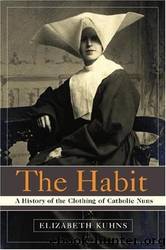The Habit: A History of the Clothing of Catholic Nuns by Elizabeth Kuhns

Author:Elizabeth Kuhns [Kuhns, Elizabeth]
Language: eng
Format: epub
Published: 2007-12-18T00:00:00+00:00
CHAPTER SIX
Charity
At the same time that the Fifth Lateran Council (1512â1517) decreed that the religious habit was a deterrent to worldliness, materialism, and moral decay, a radical new theology began its sweep across Europe. An Augustinian monk named Martin Luther (1483â1546) launched the Protestant Reformation in 1517 by pinning his Ninetyfive Theses to a church door at Wittenberg University. It spread like wildfire, and Lutherâs challenges to Catholicism would result in significant devastation. The mendicant orders that had prospered in the fifteenth century drastically declined. Convents were forced open and vandalized. Iconoclasts shattered stained glass, painted over artworks, and stole the clappers from chapel bells. Many of the great monasteries of England, Scotland, Ireland, Holland, and Scandinavia disappeared completely.
The reformers focused especially on religious habits, ripping them to shreds or burning them, ordering sisters to adopt secular dress. Some nuns refused; others wore their habits secretly under their imposed lay attire, as it was recorded of religious in Augsburg. Walled convents were ordered to install windows to bring the inhabitants into public view. Protestants proclaimed the idea of celibacy as unnatural, declaring marriage to be the most illustrious state and therefore seeking to âliberateâ nuns so they could be free to marry. Reformation intellectual Desiderius Erasmus (1466â1536) penned satirical tales about convent life that became extremely popular with the general public. In England, King Henry VIII closed monasteries and obliterated orders in order to gain their lands. Later Oliver Cromwell (1599â1658) and his Puritan Roundheads escalated Catholic persecution with fierce brutalityâhis army slaughtered over 40 percent of indigenous Irishmen, for example, who clung to their faith. Rather than being an agent of reform, the Protestant movement became a tyrannical suppression of religious freedoms of non-Protestants.
The Council of Trent convened in 1545 to reunify the devastated Catholic Church. The Council established a strict new code by which nuns were to live and promulgated enclosure for all nuns under pain of excommunication. All consecrated women living in community were required to take solemn vows and live in cloister. Abbesses could no longer leave the convent to participate in the politics of their countries. The rules of enclosure became enforced to an extreme degree; even in the nineteenth century, when an English community of Carmelites traveled to another town to start a new community, they rode in a coach with the windows painted black.1 The religious habit also received great attention from the Council, which saw it as a means to assist the renewal of religious life. Trent banned the secular dress that some nuns had taken up as a result of political unrest. It focused on uniformity in dress and made it part of Church law that the habit was to be given at the beginning of a sisterâs novitiate.
This strict legislation fostered an entirely new mode of religious life. New orders began to establish themselves purposely outside of the boundaries that Trent had set up. These orders did not accept solemn vows or the religious habit and created a way of
Download
This site does not store any files on its server. We only index and link to content provided by other sites. Please contact the content providers to delete copyright contents if any and email us, we'll remove relevant links or contents immediately.
Joan of Arc by Mary Gordon(4116)
Victory over the Darkness by Neil T. Anderson(2869)
The Gnostic Gospels by Pagels Elaine(2534)
Devil, The by Almond Philip C(2334)
The Nativity by Geza Vermes(2233)
The Psychedelic Gospels: The Secret History of Hallucinogens in Christianity by Jerry B. Brown(2158)
Going Clear: Scientology, Hollywood, and the Prison of Belief by Lawrence Wright(1985)
Going Clear by Lawrence Wright(1969)
A TIME TO KEEP SILENCE by Patrick Leigh Fermor(1917)
Barking to the Choir by Gregory Boyle(1823)
Old Testament History by John H. Sailhamer(1818)
Augustine: Conversions to Confessions by Robin Lane Fox(1775)
A History of the Franks by Gregory of Tours(1729)
A Prophet with Honor by William C. Martin(1728)
The Bible Doesn't Say That by Dr. Joel M. Hoffman(1682)
The Knights Templar by Sean Martin(1655)
by Christianity & Islam(1636)
The Source by James A. Michener(1619)
The Amish by Steven M. Nolt(1575)
